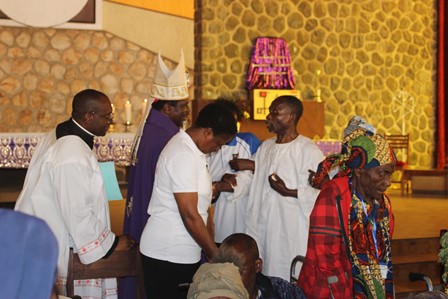Pope Francis shines a light on those who are ill and those who care for them in his message for the World Day of the Sick 2020. He also asks us to remember the difficulties experienced by those suffering and medical staff in conflict areas and he calls on governments and health institutions not to neglect those who are suffering because of financial considerations. Read Pope Francis’ message.
By Stefano Nobile, Advocacy Officer and CI Focal Point for Health and HIV
The Church’s healing service for the poor goes back to its very beginning; it is based on Jesus’ teaching and praxis, and includes caring for the sick.
The heart of Caritas, which is at the centre of the teaching of the Church in the area of charity, throbs for serving those who live in the most resource-limited settings, both in developing and developed countries.
By being the “salt of the earth” and the “light of the world”, and by caring for the needy and the afflicted, and working for justice and decent lives in 200 countries and territories across the world, day by day and night by night, Caritas diocesan and national members distribute life-saving commodities among millions of people in need. But more importantly, Caritas is with them and for them in every circumstance – not only during emergencies or crises, but also before and after.
However, these daily actions will never suffice if they do not inspire a mutual, respectful and constant dialogue between Caritas people and the communities that they serve, which are definitely better placed to be their own changer-makers.
Caritas’ commitment to the sick across the world
Caritas health workers are there for people in conflict zones in a number of places around the world. Violence means that people don’t always receive the treatment they need or medicines may not get through. In north-east Nigeria, for example, Caritas has reached people cut off by Boko Haram violence, many of who suffer from typhoid, malaria and diarrhea, by launching E-Ranger mobile clinics to diagnose and treat people in conflict zones.
Places such as Gaza, where Palestinians lack a sustainable and equitable health system, present massive long-term challenges. Caritas Jerusalem runs primary healthcare and emergency trauma clinics and mobile medical clinics.
The people of Venezuela are suffering a devastating humanitarian crisis. Caritas provides vital medicines that aren’t available in the country, other basic healthcare and identifies malnourished babies and children and provides health checks and life-saving nutritious food
Meanwhile, Caritas India has just launched on World Cancer Day (4th February) a campaign to raise awareness about cancer among students and the public. Regular free health camps in communities help detect cancer in the early stages and provide information for affordable treatment and funding in some cases. Video.
In the midst of a recent measles epidemic, Caritas Samoa has been distributing packages of essential supplies such as food, clothing, hand sanitiser, bed sheets, pillows, towels and medical face masks for hospitals, clinics and families.
Communities at the centre of HIV response
Caritas’ long-term commitment to accompanying those who are suffering and who are also marginalised can be seen in its work with people living with HIV. Communities have always been at the centre of Caritas’ HIV response, right from when we began accompanying people with HIV in 1987 and in full conformity to the teaching of the Catholic
We put faith communities at the centre of the HIV response by training their own Catholic religious leaders on the basic scientific and pastoral considerations on HIV pathology. Caritas aims to help them overcome fear, stigma and discrimination to build (or re-build) compassion, trust and confidence. Also, Caritas helps them to detect preliminary symptoms that could potentially be linked with pediatric HIV, capitalising on their pastoral leadership and compassion to address public health problems.
Over the last two years, faith communities involved in the GRAIL Project – Galvanizing Religious Actors for better Identification and Linkage to pediatric HIV – and their religious leaders reached more than 60,000 women, men and children with age-appropriate HIV messaging, especially in selected rural areas of Nigeria and DRC. They referred over 22,000 children for HIV testing; among them, 150 were diagnosed HIV-positive, but they are now under appropriate life-saving treatment.
Those 150 children did not fall into the crack of being untested – they were found, tested and eventually put under treatment.
These are just a few examples of Caritas’ global commitment to the sick across the world. Through its national and diocesan members, Caritas responds to neglected populations suffering from all the major diseases and to the health needs of the most vulnerable communities affected by health emergencies.
Our strength is our service to the poor; our force is our community work; our vision is a world without neglected populations, a world truly responding to the powerful call of the Catholic Church to put the human person at the centre of each action for humanity.

